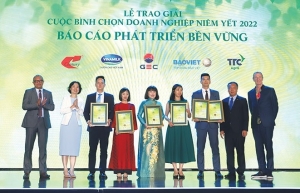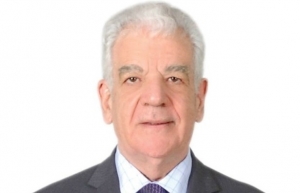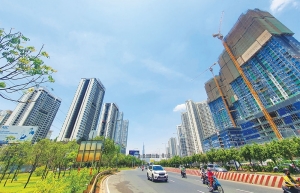ESG-centric businesses set to gain plaudits for long-term vision
What are your top priorities in this role, and can you share some of KPMG Vietnam’s plans in terms of ESG considerations?
 |
| Ha Do, KPMG’s newly appointed head of ESG in Vietnam |
One of my priorities is to increase awareness of ESG in Vietnam at all levels in businesses, from employees and middle management to senior management and the board. At the moment, ESG remains a last-minute talking point in boardrooms, and often with considerable uncertainty of what exactly it means or entails.
What is ESG and what does it mean for my business? What are the international rules, and how will multinationals implement those rules? We want to give some initial answers that can be discussed in boardrooms and among senior management to help them address some of these questions and make an informed decision on their ESG journeys.
KPMG both in Vietnam and the region have been organising workshops, webinars, and conducting surveys to promote the ESG awareness and understanding. In the near future, KPMG will work on releasing some comprehensive publications on the issue in Vietnam and the region.
We want businesses to have access to the most commonly asked questions, and address some of the misconceptions in the market. We believe that ESG is not just for foreign companies or multinationals, and it is not an expensive luxury. Rather, it has a direct impact on economic results and the future development of any enterprise.
We will also work with our partners to ensure important and relevant ESG developments are communicated with the broader business community.
How do you see the ESG landscape evolving in Vietnam and globally over the next decade?
Globally, more and more countries will implement ESG laws, regulations, and taxes to meet the United Nations’ Sustainable Development Goals, which will put companies that do not implement them at a significant disadvantage to their ESG-conscious competitors.
In a world with global trade, and with Vietnam choosing to participate in the international market, there will not really be a choice: Vietnamese businesses will need to implement ESG or risk being left out of the global marketplace. But we should not see this as a bad thing, as increased transparency, improved governance, and enhanced social awareness bring many benefits to a business and the society as a whole.
What do you think are some of the specific advantages and challenges for Vietnamese businesses when it comes to carrying out ESG practices?
Vietnamese businesses have the advantage of being able to learn from the mistakes of other nations that have already implemented ESG practices. This will allow them to avoid potential pitfalls or mistakes that other countries have made in the past. Additionally, Vietnam has historically focused on socioeconomic development, which is a key factor in achieving long-term sustainable development.
Another factor is the multilateral and bilateral assistance which is readily available from organisations such as the World Bank, the Asian Development Bank, the US Agency for International Development, and others, which have been historically supporting Vietnam in this area and are continuing to do so. One example is the recent Just Energy Transition Partnership commitment of $15.5 billion for Vietnam in terms of the energy transition.
Despite these advantages, Vietnamese businesses face several challenges when it comes to implementing ESG practices. One of the most enduring challenges, a common issue not just in Vietnam but globally, is a lack of human resources with the right skills to implement ESG solutions and initiatives, both in the government and private sector. Another challenge is the lack of robust policies and regulatory framework for ESG practices, with Europe being the leading continent in this regard.
Finally, there is a perception among some businesses that implementing ESG practices will be expensive or that it is nice to have but not necessary, and it is only for international businesses. However, having a clear roadmap and handling related reporting is a critical factor impacting the growth and reputation of a company. We see an increasing demand for ESG due diligence from investors considering investing in a target. Banks and financial institutions are encouraging their borrowers to work on an ESG management framework before applying for loans.
In particular, the Carbon Border Adjustment Mechanism introduced by the European Union into the transitional period and effective from October will have direct impacts on companies in Vietnam who are exporting cement, iron, steel, aluminium, fertilisers, hydrogen, and electricity to the EU.
What advice do you have for companies that are just starting to incorporate ESG considerations into their operations, and how do existing ESG-conscious companies balance competitiveness with the imperative to prioritise social responsibility?
For companies just starting to incorporate ESG considerations into their operations, my advice would be to first understand why they are starting this journey, as this is as important as understanding what they will be doing. This can include reforming governance to become more transparent and effective, providing a competitive advantage over competitors, accessing international ESG finance to expand business at lower costs, and meeting more stringent regulations on international trade.
Additionally, while there may be some costs associated with implementing a robust programme, there is a misconception that ESG is expensive. In fact, the benefits of implementing an ESG initiative can far outweigh the costs.
For existing ESG-conscious companies, my advice would be to balance the need to remain competitive and profitable with the imperative to prioritise sustainability and social responsibility by asking a different question. Instead of asking how to balance the two, it may be more productive to ask, “What is the cost to me if I do not start incorporating ESG into my business?” This can include higher financing costs, dwindling international clients, and reputation costs in the market.
By prioritising sustainability and social responsibility, companies can not only improve their reputation, but also reduce risk and create new business opportunities.
How do you see firmscompanies in Vietnam engaging with their stakeholders effectively, and what steps can be taken to foster greater collaboration?
Effective stakeholder engagement is critical for ESG management. In Vietnam, the tone at the top is crucial for businesses to succeed in their ESG journey. Strong commitment from the board and executive committee sets the tone for the business, but it must be backed by tangible actions.
One way to achieve this is by creating a public roadmap, which promises what the company intends to do in terms of sustainability. Engaging with customers is also essential by having conversations about ESG. Many international businesses buying from Vietnamese businesses already initiated ESG conversations as part of their commitment. Similarly, companies can engage with local communities through various community events.
In addition, conferences can provide a forum for all stakeholders to come together, learn from each other, and foster greater collaboration.
 | Listed companies lean into ESG conventions The mounting acceleration of sustainability and ESG-related criteria have been among the major concerns among financial markets, and Vietnamese organisations are allocating more resources towards improving their resilience. |
 | Why integrate ESG plans into business? Environmental, social, and governance criteria apply to governments, companies, and individuals at all levels, but here we focus on companies. This is not to say it is the most important aspect, but it is a topic of rapidly growing interest in Vietnam. |
 | The way forward to consider both sustainability and ESG Last year was not a good year for environmental, social, and governance (ESG) funds and their performance has been held back. After years of dramatic growth, investment in ESG securities has sharply declined, with research firm Morningstar reporting a 70 per cent drop in inflows compared to the year before and the number of new funds launched is down by 60 per cent. |
 | Office developers inclined to incorporate ESG standards Integrating environmental, social, and governance elements is the latest survival strategy for operators of leased office buildings, with experts noting that issues remain with post-pandemic workspace changes. |
What the stars mean:
★ Poor ★ ★ Promising ★★★ Good ★★★★ Very good ★★★★★ Exceptional
Related Contents
Latest News
More News
- Citi economists project robust Vietnam economic growth in 2026 (February 14, 2026 | 18:00)
- Sustaining high growth must be balanced in stable manner (February 14, 2026 | 09:00)
- From 5G to 6G: how AI is shaping Vietnam’s path to digital leadership (February 13, 2026 | 10:59)
- Cooperation must align with Vietnam’s long-term ambitions (February 13, 2026 | 09:00)
- Need-to-know aspects ahead of AI law (February 13, 2026 | 08:00)
- Legalities to early operations for Vietnam’s IFC (February 11, 2026 | 12:17)
- Foreign-language trademarks gain traction in Vietnam (February 06, 2026 | 09:26)
- Offshore structuring and the Singapore holding route (February 02, 2026 | 10:39)
- Vietnam enters new development era: Russian scholar (January 25, 2026 | 10:08)
- 14th National Party Congress marks new era, expands Vietnam’s global role: Australian scholar (January 25, 2026 | 09:54)

 Tag:
Tag:



















 Mobile Version
Mobile Version